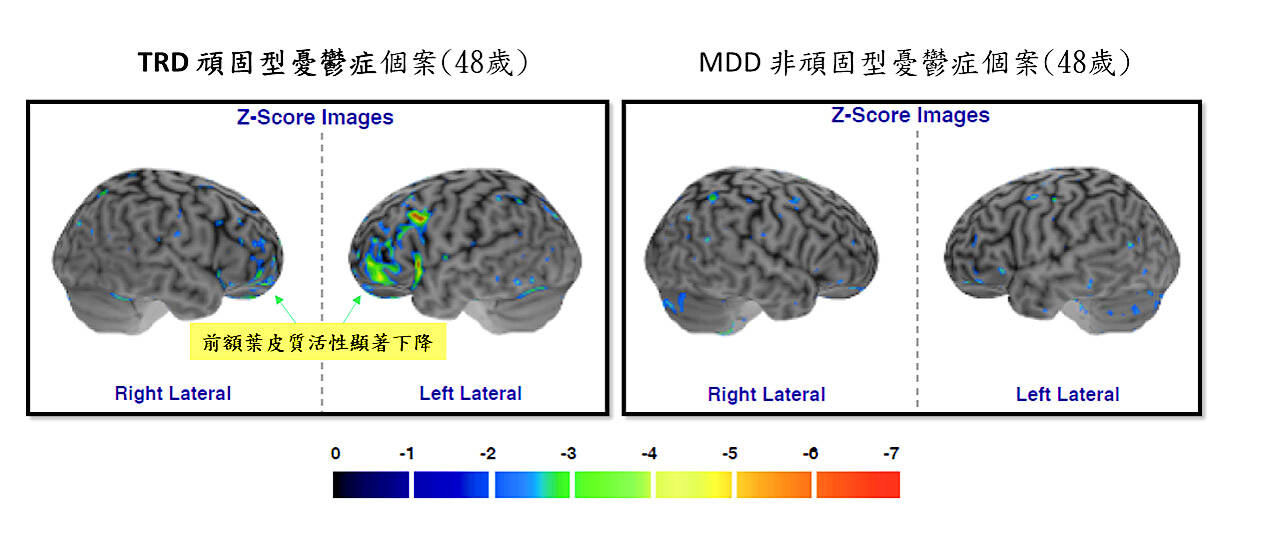Treatment-resistant depression (TRD) could be genetically passed on, a study by Taipei Veterans General Hospital showed.
The study showed that first-degree relatives of patients with TRD are two or three times more likely to have other mental illnesses, such as anxiety disorders, obsessive-compulsive disorders, depression, bipolar disorders and schizophrenia, the hospital’s Precision Depression Intervention Center director Li Cheng-ta (李正達) said.
First-degree relatives of TRD patients are 9.16 times more likely to be diagnosed with the disease, the study showed.

Photo courtesy of the Taipei Veterans General Hospital
Through the analysis of medical data in Taiwan, the study confirmed that TRD can be passed on through genes and the condition is a physical illness, not mental, Li said.
CNN also reported on the hospital’s study, saying that it “analyzed national health insurance data for the entire population of Taiwan for a 15-year period ... more than 21,0000 people went on to be diagnosed with treatment-resistant depression.”
“This is the most convincing evidence so far that treatment-resistant depression tends to run in families,” Andrew McIntosh, a professor of psychiatry at the Centre for Clinical Brain Sciences at the University of Edinburgh in Scotland, told CNN.
He was not involved in the study.
“While the findings imply a genetic basis, family members might also share life events, socioeconomic disadvantages or other unidentified risk factors,” McIntosh was quoted as saying.
Family members of a patient need not be overly concerned, as the study only indicated higher risk and did not state that family members would definitively be diagnosed with TRD, Li said.
Although they might be more susceptible to pressure, they should be alright if they are aware and take measures to release it, Li said.
Hospitals have many methods to help treat TRD patients, including phototherapy and radiotherapy, as well as medicinal methods that seek to help patients’ brain regain activity by simulating the frontal lobe, Li added.
The article was published in the international journal JAMA Psychiatry on April 3. The first author was Cheng Chih-ming (鄭智銘) and Li was a contributing author.

TRAGEDY: An expert said that the incident was uncommon as the chance of a ground crew member being sucked into an IDF engine was ‘minuscule’ A master sergeant yesterday morning died after she was sucked into an engine during a routine inspection of a fighter jet at an air base in Taichung, the Air Force Command Headquarters said. The officer, surnamed Hu (胡), was conducting final landing checks at Ching Chuan Kang (清泉崗) Air Base when she was pulled into the jet’s engine for unknown reasons, the air force said in a news release. She was transported to a hospital for emergency treatment, but could not be revived, it said. The air force expressed its deepest sympathies over the incident, and vowed to work with authorities as they

A tourist who was struck and injured by a train in a scenic area of New Taipei City’s Pingsi District (平溪) on Monday might be fined for trespassing on the tracks, the Railway Police Bureau said yesterday. The New Taipei City Fire Department said it received a call at 4:37pm on Monday about an incident in Shifen (十分), a tourist destination on the Pingsi Railway Line. After arriving on the scene, paramedics treated a woman in her 30s for a 3cm to 5cm laceration on her head, the department said. She was taken to a hospital in Keelung, it said. Surveillance footage from a

BITTERLY COLD: The inauguration ceremony for US president-elect Donald Trump has been moved indoors due to cold weather, with the new venue lacking capacity A delegation of cross-party lawmakers from Taiwan, led by Legislative Speaker Han Kuo-yu (韓國瑜), for the inauguration of US president-elect Donald Trump, would not be able to attend the ceremony, as it is being moved indoors due to forecasts of intense cold weather in Washington tomorrow. The inauguration ceremony for Trump and US vice president-elect JD Vance is to be held inside the Capitol Rotunda, which has a capacity of about 2,000 people. A person familiar with the issue yesterday said although the outdoor inauguration ceremony has been relocated, Taiwan’s legislative delegation has decided to head off to Washington as scheduled. The delegation

Another wave of cold air would affect Taiwan starting from Friday and could evolve into a continental cold mass, the Central Weather Administration (CWA) said yesterday. Temperatures could drop below 10°C across Taiwan on Monday and Tuesday next week, CWA forecaster Chang Chun-yao (張竣堯) said. Seasonal northeasterly winds could bring rain, he said. Meanwhile, due to the continental cold mass and radiative cooling, it would be cold in northern and northeastern Taiwan today and tomorrow, according to the CWA. From last night to this morning, temperatures could drop below 10°C in northern Taiwan, it said. A thin coat of snow